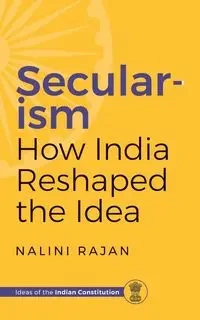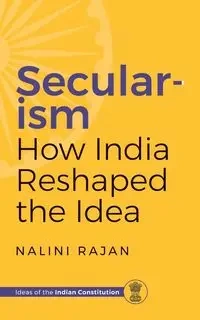SECULARISM HOW INDIA RESHAPED THE IDEA - Rajan Nalini
Secularism emerged in 17th-century Europe as an essential element of what
became the modern state. The separation of church and state that it entailed
paved the way for the democratic republics we take for granted today.
Tolerance, as understood in the West, was sought to be introduced as state
policy by the British in India too. But our nationalist leaders understood their
country better than to adopt the concept without local adjustments.
Political philosopher Nalini Rajan examines the tension between religious
freedom and state intervention in India, a tension that comes with the idea
of 'principled' state intervention in matters of religion, as mandated by the
Constitution. Demands for reservations and separate electorates by minorities
in the early twentieth century had essentially ruled out absolute state neutrality
in this respect. But it is only by analysing the fascinating debates on secularism
in the Constituent Assembly (1946-49) that we see how and why the specific
provisions on minority rights-Articles 25 to 30-came to be adopted. These
provisions implicitly envisioned a key role for the judiciary. A full section of
this book is thus devoted to understanding the role that the courts have played
in establishing, and just as importantly, defining Indian secularism-through
such judgements as in the Shirur Mutt case of 1954, the Durgah Committee case of
1961, the Satsangi case of 1966, the Stanislaus case of 1977, the Shah Bano case
of 1985, the so-called 'Hindutva' cases of 1996, the Vaishno Devi case of 1997,
and the Puttaswamy case of 2017.
This exhaustive monograph should be read by all those interested in
understanding how a distinctive secularism shaped modern India, and how the
latter shaped our secularism.
EAN: 9789354476730




Secularism emerged in 17th-century Europe as an essential element of what
became the modern state. The separation of church and state that it entailed
paved the way for the democratic republics we take for granted today.
Tolerance, as understood in the West, was sought to be introduced as state
policy by the British in India too. But our nationalist leaders understood their
country better than to adopt the concept without local adjustments.
Political philosopher Nalini Rajan examines the tension between religious
freedom and state intervention in India, a tension that comes with the idea
of 'principled' state intervention in matters of religion, as mandated by the
Constitution. Demands for reservations and separate electorates by minorities
in the early twentieth century had essentially ruled out absolute state neutrality
in this respect. But it is only by analysing the fascinating debates on secularism
in the Constituent Assembly (1946-49) that we see how and why the specific
provisions on minority rights-Articles 25 to 30-came to be adopted. These
provisions implicitly envisioned a key role for the judiciary. A full section of
this book is thus devoted to understanding the role that the courts have played
in establishing, and just as importantly, defining Indian secularism-through
such judgements as in the Shirur Mutt case of 1954, the Durgah Committee case of
1961, the Satsangi case of 1966, the Stanislaus case of 1977, the Shah Bano case
of 1985, the so-called 'Hindutva' cases of 1996, the Vaishno Devi case of 1997,
and the Puttaswamy case of 2017.
This exhaustive monograph should be read by all those interested in
understanding how a distinctive secularism shaped modern India, and how the
latter shaped our secularism.
EAN: 9789354476730

